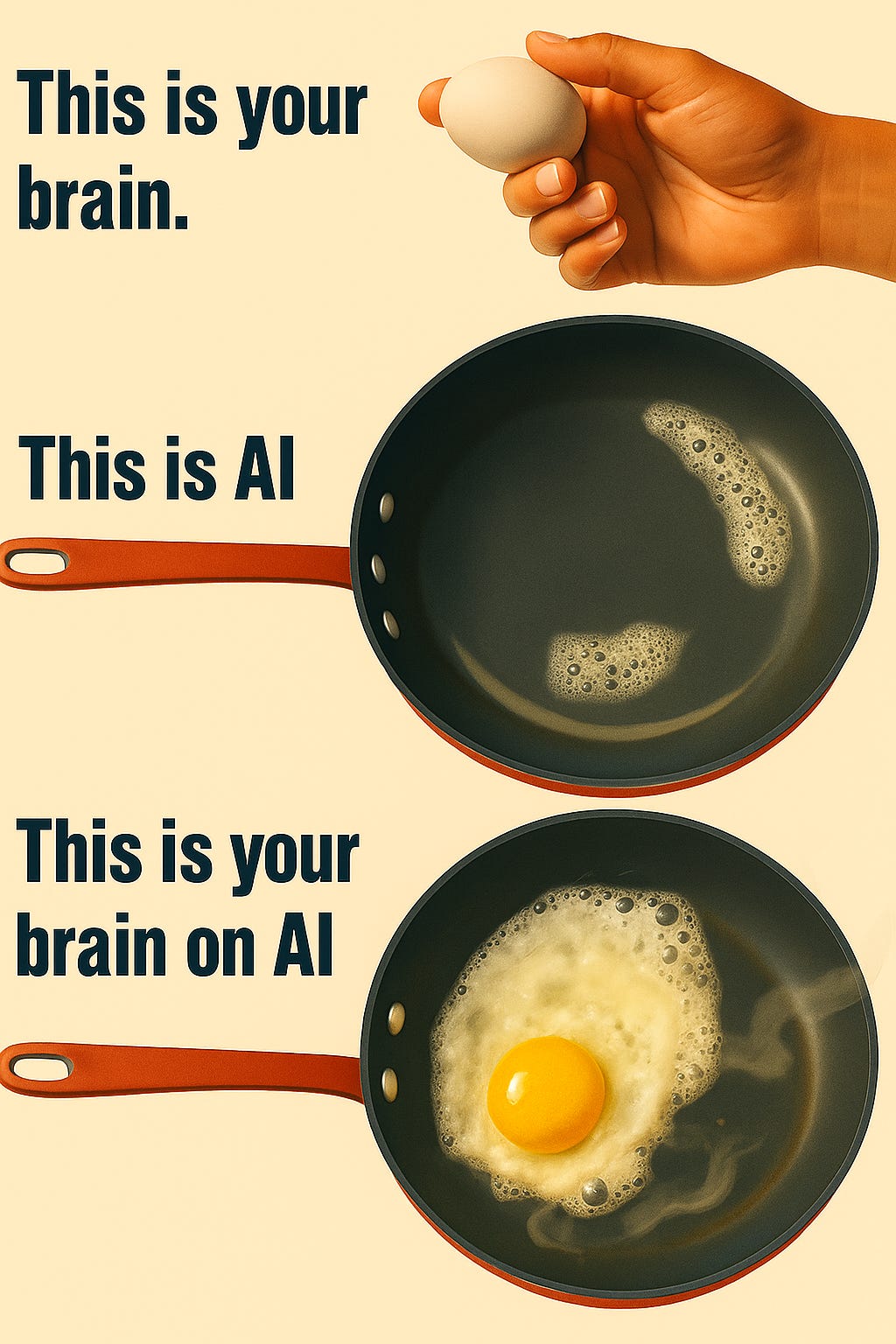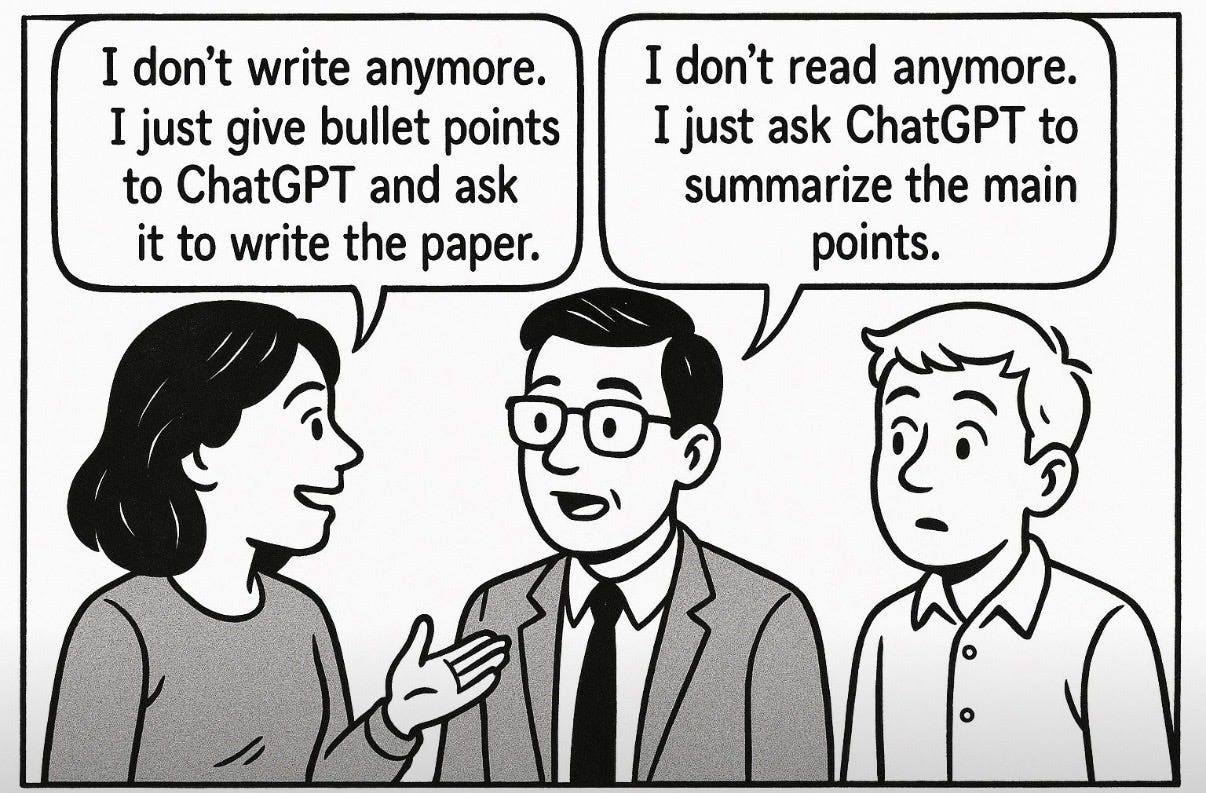A recent MIT study on AI is making the rounds, and it’s one of the most important pieces of research on AI I’ve read to date. It’s not about what AI can do for us; rather, it’s about what AI does to us, and that’s a far more important consideration. I took the liberty of adapting an ad campaign from the 1980s to make the point (perhaps some of you remember the ad).
Comparing Human and AI-Assisted Thinking
To quickly summarize the study, a group of people were put into three groups: LLM, Search Engine, and Brain Only. Each group was asked to write an essay using the tools they were allowed to use. The findings were quite telling:
Using LLMs reduces cognitive effort but incurs cognitive debt as users offload memory, structure, and decision-making to AI.
Learning is compromised in depth, originality, and retention.
While LLMs increase efficiency, they may weaken long-term learning, memory encoding, and critical thinking.
Educational contexts must balance AI convenience with cognitive development goals.
In the next phase of the study, the participants in the Brain Only group were switched with those in the LLM group, and this is where things got interesting. When the Brain Only group used an LLM, they were more effective in the use of AI because their cognitive debt was minimal. When asked to use their brains alone, the former LLM group struggled. To quote the study, “the Brain-only group reported higher satisfaction and demonstrated higher brain connectivity, compared to other groups. Essays written with the help of LLM carried a lesser significance or value to the participants, as they spent less time on writing and mostly failed to provide a quote from their essays.”
In other words, they couldn’t remember what they had “written” with the help of AI. Yes, you can finish an informative piece in record time, but 30 minutes later, trying to quote a line from it, you draw a blank. It’s like relying on GPS so often you forget how to get home without it.
To put it plainly, use it or lose it. No different than many other things in life.
You might be able to generate more content than anyone else, but if it’s just a facade that even you don’t fully understand or remember, it’s just noise.
I’m both a fan and a critic of AI. I am excited about the possibilities and cautious of the unforeseen impact it may have on our lives. But to think that it’s unavoidable that we give up our creative drive to a machine is soul-destroying. In my search for a middle ground where humans and AI can peacefully coexist, it’s perpetually disappointing to watch people freely give up their creative drive in favor of speed alone.
Full disclosure, I use AI almost daily. Like many, I use it to summarize things. I use AI tools to edit and check grammar, and I’ve found them invaluable for critiquing the flow of my writing. I use it most often to learn new things. Being able to dive into a topic at my own pace and follow my own interests has been amazing. I also do my best to ensure that the information AI provides is accurate by verifying it against other credible sources. Until we get to a place where AI hallucinations are rare or non-existent, if that day ever comes, I’ll continue to double-check what it tells me before I assume some confidently stated BS is truth.
When You Can’t Remember What You “Wrote”
For those taking an AI-first approach for everything, you’re risking more than cognitive debt. You’re putting your credibility at risk. Imagine writing something and being unable to recall a single quote from it. You might be able to generate more content than anyone else, but if it’s just a facade that even you don’t fully understand or remember, it’s just noise.
As the cartoon below illustrates, we all seem to be in a hurry to get AI to write something for us, and others may have little intention of reading it because they’ll use AI to read it and summarize it for us. So why not just stick to bullet points and skip the AI middleman?
Because humans value connection. We value reading things that evoke a strong emotional response to the topic.
A Quick Demonstration
One of my favorite recent reads was “The Solace of Open Spaces” by Gretel Ehrlich. Here’s how ChatGPT summarized the book:
“The Solace of Open Spaces by Gretel Ehrlich is a collection of lyrical essays reflecting on life in the vast, rugged landscape of Wyoming. Through observations of nature, ranching, solitude, and grief, Ehrlich explores how the open spaces of the American West shape resilience and a deep sense of belonging.”
Yep, that’s what it’s about. But if you stop there, you’ll miss the soul of her writing:
“Last week a bank of clouds lowered itself down summer’s green ladder and let loose with a storm. A heavy snow can act like fists: trees are pummeled, hay and grainfields are flattened, splayed out like deer beds; field corn, jackknifed and bleached blond by the freeze, is bedraggled by the brawl.”
Quite a difference. And one worth taking precious time to read. One gives you the data; the other gives you the depth. One, you understand. The other, you feel.
We Write to Connect
As writers, whether you’re an accomplished novelist or creating copy for a product website, our aim should be to connect. To use a phrase that has become overused, the goal is to be our most authentic selves. When we write from that perspective, others sense it.
Ultimately, whether you’re a novelist or a copywriter, we want others to read, understand, and feel something. That feeling can be the end goal, or it can spur us to take action. Lacking that human authenticity, you won’t connect as well with people, and they won’t take action.
Have we somehow convinced ourselves that a machine can duplicate the things that have molded us and made each of us a unique force? It appears that many people have forgotten who we are and are willing to substitute the speed and quantity that AI makes possible for that which makes us “us.” What are we doing?
Using AI Without Losing Ourselves
I’m concerned that the more we give up to AI, the more we sacrifice that uniqueness. In a world that seems to believe that more is always the goal, AI could actually leave us with less control, less credibility, and less of ourselves.
One thing is certain. AI has arrived, and it’s here to stay. We must find a way to live alongside its power without hollowing ourselves out, without mortgaging the mind’s creativity and resilience for the noise of convenience.
Note: Read the complete study here.






Really enjoyed this, Kevin. The short-term rewards from the productivity boost AI provides are definitely tempting. But the costs are high, and both the study and your article make that so concrete.
As a reader, I've been fatigued at the sheer amount of Gen AI content out there, but I don't think it's just about volume. I think this quote touches on why:
"As writers, whether you’re an accomplished novelist or creating copy for a product website, our aim should be to connect. To use a phrase that has become overused, the goal is to be our most authentic selves. When we write from that perspective, others sense it."
Another great piece, Kevin. Interesting study, great summary, and fascinating reflections on what AI does TO us as well as for us. As usual, finding (and maintaining) a balance is key.